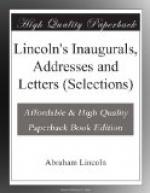The Eulogy of Henry Clay of 1852 is of interest as being the only address of this kind that Lincoln ever delivered. It might perhaps better be called an appreciation, and because of its sincerity and deep sympathy it may be regarded as a model of its kind. Two years later Lincoln engaged in his first real debate with Douglas on the burning question of the day, the repeal of the Missouri Compromise. From the purely literary point of view the Peoria Speech is superior to the better-known debates of four years later. While it lacks the finish and poise of the two Inaugurals it is far more imaginative than the Debates. One of its most striking features is the comparatively large number of quotations, both from the Bible and from profane writings. Although as a rule Lincoln quotes sparingly, this one speech contains no fewer than twelve quotations, seven of these being from the Bible. The only other speech that equals this one in the number of quotations is the so-called Lost Speech of 1856, the authenticity of which is doubtful. The very much shorter Second Inaugural, however, with its four Bible quotations, has a larger proportionate number. Lincoln’s quotations seem to be suggested emotionally rather than intellectually. This is indicated by the fact that the most emotional speeches contain the greatest number of quotations. The first Inaugural, for example, which is in the main a sober statement of principles, intended to quiet rather than to excite passion, is four times as long as the emotional Second Inaugural, but contains only one quotation to the four of the other. We may note in this connection that almost exactly one-half of the total number of quotations occurring in Lincoln’s writings are taken from the Bible, and that a large proportion of the profane quotations are from Shakespeare. Lincoln was also fond of using proverbial sayings, a habit that emphasized his character as a popular or national writer. For most of his proverbs are local and many of them are intensely homely. Quotations of this class occur at all periods of his life, beginning with the first address, and they are sometimes used in such unexpected places as official telegrams to officers in the field. Strange to say, the maxim that is most frequently associated with Lincoln’s name cannot with any certainty be regarded as having been used by him, either as a quotation or as an original saying, “You can fool all of the people some of the time, and some of the people all the time, but you cannot fool all the people all the time.”
At the first regular Republican State Convention in Illinois, held at Bloomington, May 29, 1856, Lincoln delivered an address on the public issues of the day that roused the enthusiasm of his hearers to such a degree that the reporters forgot to take notes and therefore failed to furnish the text to their respective newspapers. In the course of time it came to be known as the Lost Speech, and such, in the opinion of many who were present on the occasion, it continued to be. Mr. W. C. Whitney, a young lawyer from the neighboring town of Champaign, later prepared a version based upon notes, from which some general idea of the character of the speech can perhaps be gained.




